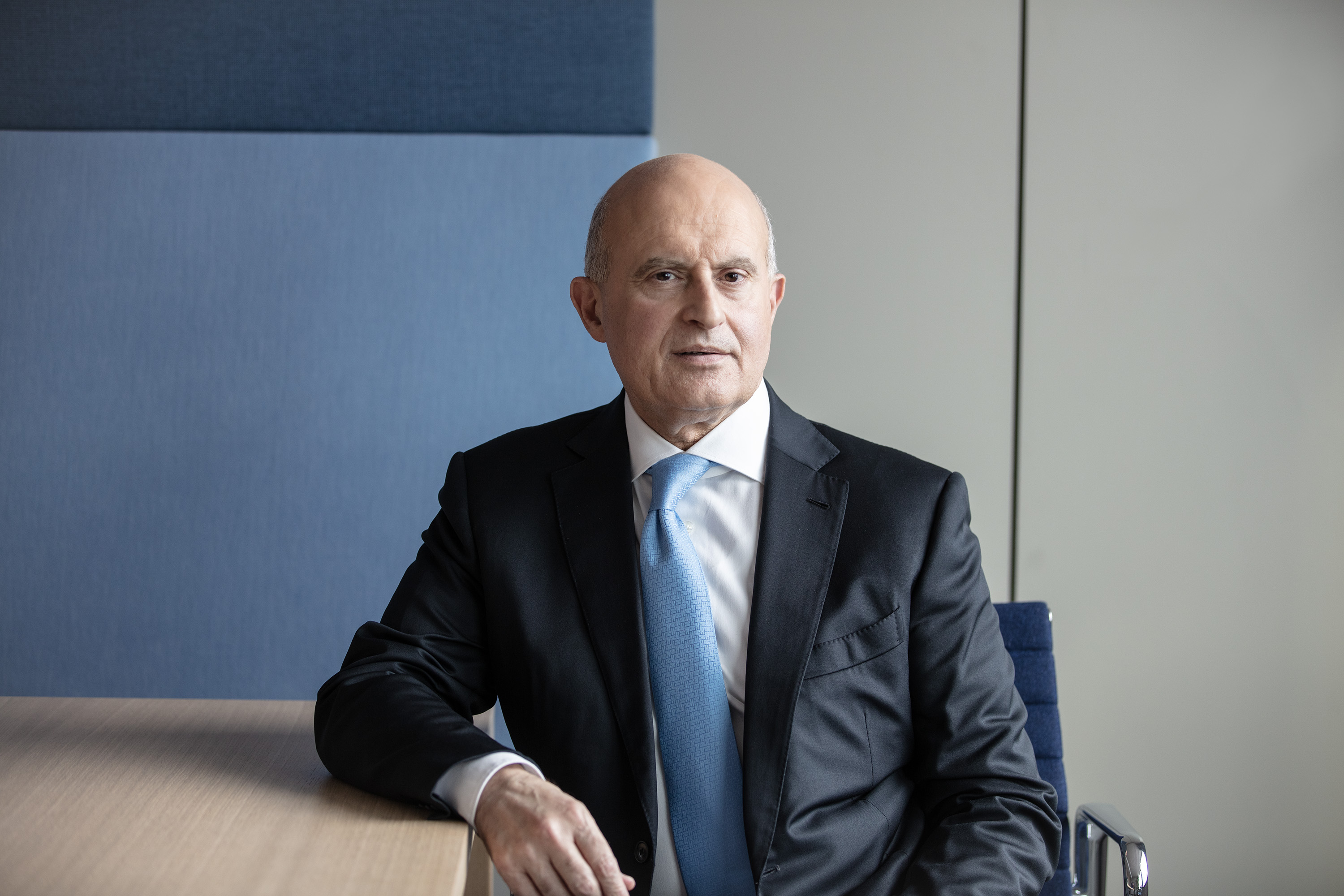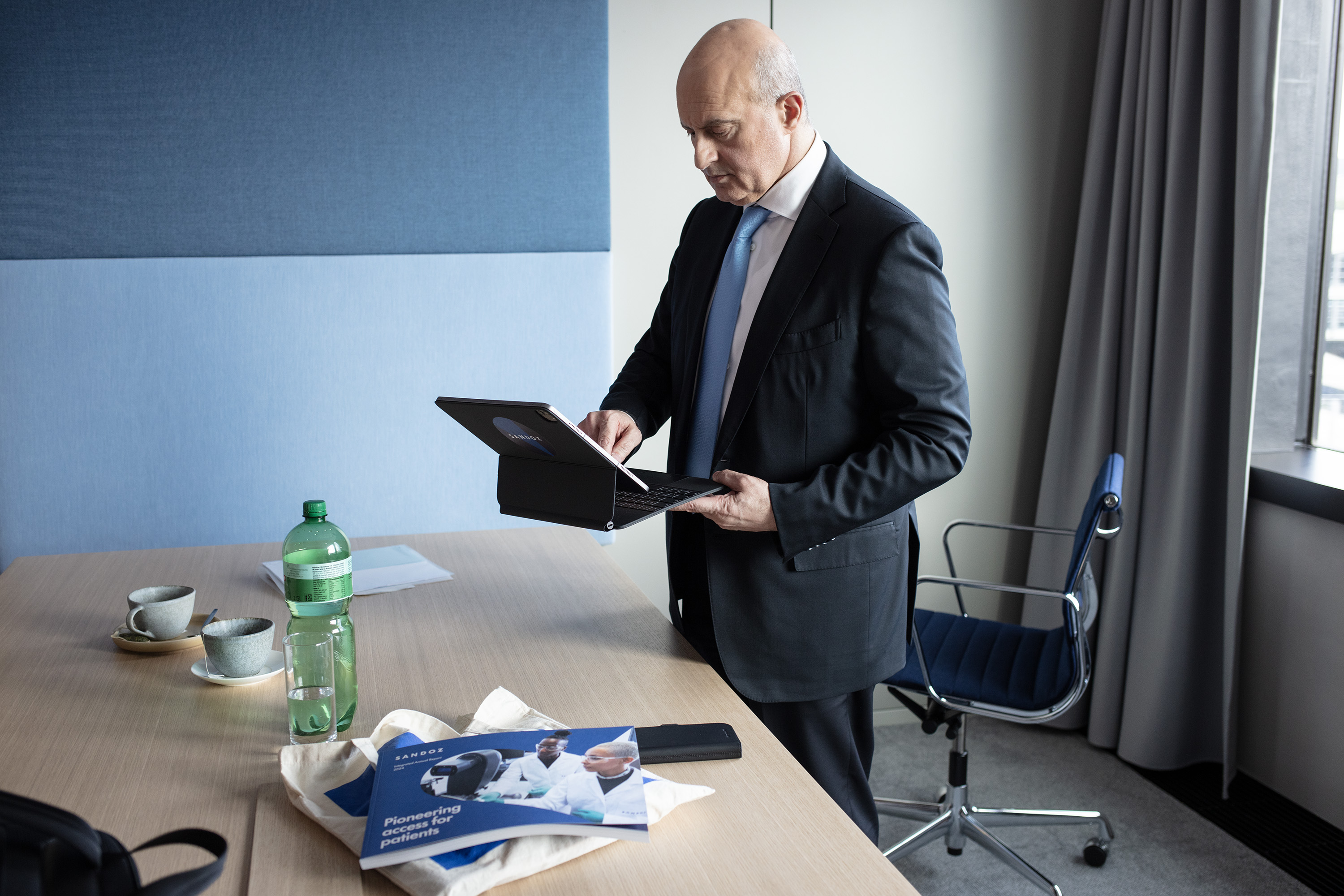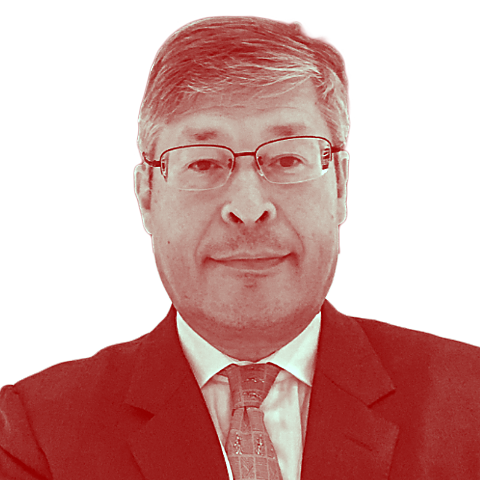
Sandoz board chair ‘convinced that common sense will ultimately prevail’ on US pharma tariffs

In an exclusive interview with Swissinfo, Gilbert Ghostine, the chair of the board of pharma firm Sandoz, says he remains optimistic despite looming tariff hikes.
Pharmaceuticals have so far been excluded from the sweeping new tariffs announced by the United States, but the sector may not be spared for long. The pharma industry, including generics, could be hit with 25% tariffs or more. A company like Sandoz, which specialises in generic and biosimilar drugs, depends on tight supply chains and thin margins, so the prospect of tariffs means reviewing its US strategy and potential price hikes.
Swissinfo met Sandoz board chair Gilbert Ghostine at the company’s headquarters in Basel. In an exclusive interview, he analyses the impact that US tariffs would have on the company, the pharma sector’s dependence on certain regions for sourcing, and ways to avoid future drug shortages.
– Born in 1960
– Lebanese and Canadian citizenship
– “Serial globe trotter”: has moved 20 times and lived on four continents in the last 40 years.
– Since February 2023: chair of the board of Sandoz
– Since October 2022: board member of Danone
– Since July 2022: board member of Four Seasons Hotels and Resorts
– 2014-2023: CEO of Firmenich
– 1993-2014: senior leadership positions at Diageo on four continents
– 2001: Advanced Management Program, Harvard Business School
– 1985: MBA, Saint Joseph University, Lebanon
Swissinfo: Sandoz CEO Richard Saynor mentioned that some products could be withdrawn from the US market if the Trump administration imposes high tariffs on generic medicines imported from Europe. How might tariffs affect your product range and which drugs could be pulled from the market?
Gilbert Ghostine: We evaluate our portfolio regularly to ensure that we’re delivering value and that a reliable supply of medicines is available to patients. In some instances, certain products can become economically unviable because of factors like price erosion, rising supply-chain costs, and changing regulatory requirements. In such cases, we might consider streamlining or redefining some of our product priorities.
In the coming years, we hope to become the US market leader in biosimilar drugs, [which are cheaper versions of brand-name “biologic” medicines created from living cells or organisms]. We have planned several new product launches.
Swissinfo: Do you think US patients will see price hikes for generic drugs – even if these prices aren’t directly set by Sandoz?
G.G.: We’re opposed to tariffs on pharmaceutical products – especially on generics and biosimilars – because tariffs could lead to higher prices, reduced supplies of, and access to, medicines. We don’t believe tariffs would be beneficial to the US healthcare system and they’d be even less so to patients.

Swissinfo: Do you think the war on tariffs could have negative effects on your margins, not only in the US but also globally?
G.G.: With the current tariffs, which are focused mainly on China and have some impact on Canada, our forecasts for the year can absorb the new taxes. In addition, we expect only a limited indirect impact from our contract manufacturing organisations.
We’re following the situation closely, and we’re confident in our ability to deal with further tariff measures.
Swissinfo: Do you know whether generics might be spared possible tariffs?
G.G.: I’m an eternal optimist, and I’m convinced that common sense will ultimately prevail because you cannot play games with people’s health.
Our US teams are regularly invited to the White House to explain specific features of generic and biosimilar medicines. These teams make it clear that establishing a factory in the US – where we do not currently manufacture – would take three to five years, to which you’d need to add one to two years to obtain the required production authorisations. And availability of generics is essential for ensuring patient access to affordable medicines.
We also have confidence in the Swiss authorities, especially the federal government, SECO [the State Secretariat for Economic Affairs], and the Swiss embassy in Washington, DC. Their commitment to finding good solutions is exemplary.
Lastly, it’s helpful to keep the seriousness of this situation in perspective because the United States represents less than 20% of our total sales.
SWI: Sandoz considers drug availability to be one of its reasons for being. What is required to maintain availability?
G.G.: A secure supply of ingredients is a key factor. On this point, the recent Covid-19 pandemic was a real wake-up call for the western world, which became aware of its dependence on China and India, particularly for active pharmaceutical ingredients.
For this reason, we now produce – in our own factory in Austria – all of the active ingredients required for our antibiotics and biosimilars destined for the European and US markets. We are, in fact, the only European company in our field to do so.
SWI: How do you respond to fluctuations in demand?
G.G.: This is another key element. A particularly harsh winter, for example, generates an exceptionally high demand for antibiotics. For technical reasons, it’s not possible to produce a lot more overnight.
In addition to fluctuations in demand, the drug supply itself can also vary. In 2025, Sandoz will be able to produce its intended supply, but some of our competitors could produce less than expected.
For these various reasons, about 100 of the 1,200 products that we market in Switzerland were out of stock last year.
Swissinfo: What can be done to address chronic drug shortages?
G.G.: We’re working on solutions with the authorities in many countries, including SwissmedicExternal link, the Swiss Agency for Therapeutic Products. Currently, when there is a drug shortage in Switzerland, we unfortunately can’t use medicines destined for European Union countries because of the specific rules governing package labelling and information inserts. Perhaps one solution might be to replace the inserts with bar codes?
In addition, a number of countries – Switzerland among them – buy emergency stocks of certain key drugs or ask us to maintain reserves for them.
Swissinfo: What is the availability of your medicines in developing countries, for example in Africa?
G.G.: Each country is different and I don’t think it’s possible to generalise by continent. We treat every country in the same manner. Obviously healthcare-system management, regulations, and the level of economic development vary from one country to the next. Furthermore, in some countries we market our products directly, while in others we go through external distributors or state authorities.

SWI: Switzerland wants Sandoz to contribute to the self-sufficiency of the country’s healthcare system. But your company doesn’t manufacture in Switzerland. It did, however, decide to manufacture in certain neighbouring EU countries – at a higher cost than, for example, in India. This allows Sandoz to benefit from EU subsidies. Do you also receive Swiss subsidies for this?
G.G.: The Swiss authorities are very comfortable with our production base, 70% of which is located in Europe: in Austria, Germany, Slovenia, and, to a lesser extent, Spain. At our European sites, we have quotas and production lines reserved for Switzerland and also for other countries, including the United States.
In Kundl, in the Austrian Tyrol, we have a large manufacturing facility capable of producing all of our antibiotics (including their active substances) for the European market. Over the past three years, we invested €250 million (CHF234 million) to increase its capacities. As a result, we received €50 million (CHF47 million) from the EU thanks to an Austrian initiative supported by the Swiss authorities. We have not, however, received any Swiss subsidies.
SWI: Sandoz focuses heavily on biosimilars. Is this because their added value is particularly high?
G.G.: When Sandoz launched its first biosimilar in 1996, it created a new category. In 2024, we achieved 30% growth in this sector, in which we are currently the world leader, with annual sales of nearly USD3 billion (CHF 2.4 billion). It’s true that the development of biosimilars is a priority for us, thanks to the high added value of these drugs.
The field of biosimilars is also extremely complex, with steep barriers to entry. Developing a biosimilar requires an investment of USD200 to 500 million (CHF161 to 403 million) over eight to 12 years. We have to conduct numerous clinical trials and obtain market authorisations from the relevant authorities. In comparison, developing a generic drug “only” costs USD3 to 5 million (CHF2.4 to 4 million) and “only” takes two to three years.
Swissinfo: Given Sandoz’s extensive expertise, particularly in biosimilars, will your next step be the development of new brand-name drugs?
G.G.: That’s absolutely not our intention because the potential for growth in our existing fields is enormous. The expiry of patents on brand-name drugs over the next ten years will create a new market worth $500 billion during that period.
Of course we don’t wait for a patent to expire before we start working and we invest nearly $1 billion a year in our development and regulatory efforts. When we start working on drugs long before their patents expire, we obviously don’t know which competitors are working on the same ones – so this choice is, by definition, risky.
Swissinfo: Are you planning to develop GLP-1s, the drugs that are currently very popular for treating type 2 diabetes and obesity?
G.G.: Given the success of these drugs, they offer an enormous opportunity for Sandoz – and especially for patients looking for affordable prices. As of 2026, after the patents expire, we will market versions of these drugs in certain countries (Canada, Brazil, Mexico and Saudi Arabia).

Swissinfo: Will Sandoz increasingly manufacture in low-wage countries such as India, where you have major competitors?
G.G.: We have three major industrial parks in Europe with long-term manufacturing experience that are well integrated into the supply chain.
These sites are very large, and this allows economies of scale, a reduced environmental footprint, a high degree of automation and maximum quality. These facilities naturally contribute to European self-sufficiency in healthcare, pay local taxes, employ many people, and respect human rights, including employee safety – all of which satisfy the European authorities.
When we submit a drug for market authorisation in Europe, all of these factors are taken into account – not just the price. As a result, we will continue to focus on our European production sites. So we don’t plan to prioritise moving to countries with the lowest costs. That said, 30% of our current production takes place outside Europe, including in a large factory in India.
Swissinfo: Some of the drugs you market are manufactured by external companies. Is this a growing trend?
G.G.: No, but we will continue to outsource 40% to 50% of our production as this allows us to react more flexibly to fluctuations in demand.
Adapted from French by K. Bidwell. Edited by Virginie Mangin/gw
This article was updated on June 30 to specify that developing a biosimilar requires an investment of $200 million to $250 million over eight to 12 years.
A previous version stated that developing a biosimilar requires an investment of $200 million to $500 million over eight to 12 years.
More

In compliance with the JTI standards
More: SWI swissinfo.ch certified by the Journalism Trust Initiative

































You can find an overview of ongoing debates with our journalists here . Please join us!
If you want to start a conversation about a topic raised in this article or want to report factual errors, email us at english@swissinfo.ch.